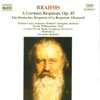Brahms/Schumann Requiems
View record and artist detailsRecord and Artist Details
Composer or Director: Johannes Brahms
Label: Naxos
Magazine Review Date: 5/1994
Media Format: CD or Download
Media Runtime: 67
Mastering:
Stereo
DDD
Catalogue Number: 8 550213

Tracks:
| Composition | Artist Credit |
|---|---|
| (Ein) Deutsches Requiem, 'German Requiem' |
Johannes Brahms, Composer
Alexander Rahbari, Conductor Bratislava Radio Symphony Orchestra Eduard Tumagian, Baritone Johannes Brahms, Composer Miriam Gauci, Soprano Slovak Philharmonic Chorus |
Composer or Director: Johannes Brahms
Label: Duo
Magazine Review Date: 5/1994
Media Format: CD or Download
Media Runtime: 135
Mastering:
ADD
Catalogue Number: 438 760-2PM2

Tracks:
| Composition | Artist Credit |
|---|---|
| (Ein) Deutsches Requiem, 'German Requiem' |
Johannes Brahms, Composer
Franz Crass, Bass Johannes Brahms, Composer Vienna Singverein Vienna Symphony Orchestra Wilma Lipp, Soprano Wolfgang Sawallisch, Conductor |
| Alto Rhapsody |
Johannes Brahms, Composer
Aafje Heynis, Contralto (Female alto) Johannes Brahms, Composer Vienna Singverein Vienna Symphony Orchestra Wolfgang Sawallisch, Conductor |
| Schicksalslied |
Johannes Brahms, Composer
Johannes Brahms, Composer Vienna Singverein Vienna Symphony Orchestra Wolfgang Sawallisch, Conductor |
| Academic Festival Overture |
Johannes Brahms, Composer
Johannes Brahms, Composer Vienna Symphony Orchestra Wolfgang Sawallisch, Conductor |
| Tragic Overture |
Johannes Brahms, Composer
Johannes Brahms, Composer Vienna Symphony Orchestra Wolfgang Sawallisch, Conductor |
| Variations on a Theme by Haydn, 'St Antoni Chorale |
Johannes Brahms, Composer
Johannes Brahms, Composer Vienna Symphony Orchestra Wolfgang Sawallisch, Conductor |
Composer or Director: Robert Schumann
Label: Rouge et Noir
Magazine Review Date: 5/1994
Media Format: CD or Download
Media Runtime: 128
Mastering:
DDD
Catalogue Number: 767819-2

Tracks:
| Composition | Artist Credit |
|---|---|
| Requiem |
Robert Schumann, Composer
Bernhard Klee, Conductor Dietrich Fischer-Dieskau, Baritone Doris Soffel, Mezzo soprano Düsseldorf Musikverein Chorus Düsseldorf Symphony Orchestra Helen Donath, Soprano Nicolai Gedda, Tenor Robert Schumann, Composer |
| Requiem für Mignon |
Robert Schumann, Composer
Andrea Andonian, Soprano Bernhard Klee, Conductor Brigitte Lindner, Soprano Dietrich Fischer-Dieskau, Baritone Düsseldorf Musikverein Chorus Düsseldorf Symphony Orchestra Mechthild Georg, Mezzo soprano Monika Weichhold, Mezzo soprano Robert Schumann, Composer |
Author:
Miriam Gauci and Eduard Tumagian both sing well, Gauci with a particularly pure upper register, Tumagian with healthy resonance; but neither has the spirituality their music requires, Gauci insufficiently tender, Tumagian too stolid in his depiction of man's life passing as a shadow. Rahbari is sensible in his speeds, but unimaginative in building the crescendo of ''Denn alles Fleisch'' and he carries real conviction only in the ''sound of the trumpet'' passage, the vivace of No. 6, which is rather late in the day.
The reissues are far more sharply defined in sound, the Tennstedt on EMI being decidedly the better, both in quality of sound and in the care and insight of performance. That is not tantamount to recommending it, however. The speeds, particularly of the outer movements (one and seven), are inordinately slow, and, though many fine details of the score can be savoured in this way, the effect is too often that of an object passed in slow motion for close (and admittedly loving) inspection. Sawallisch favours much quicker speeds, but sometimes, notably in ''Wie lieblich'', is merely businesslike. His choir, the Vienna Singverein, has its usual complement of trembly sopranos, and his soloists give limited pleasure, Wilma Lipp because her light, somewhat insecure voice is out of place here, Franz Crass because he gives so little expression to the text. Jorma Hynninen, with Tennstedt, is easily the best of the three baritones under review, Jessye Norman being only marginally so among the sopranos, for her tone is too vibrant and earthy, especially in the first half.
The second CD of the Philips set has a good selection, useful to anybody feeling their way with Brahms and wanting to fill in some gaps. These are spirited performances, and the recordings survive well, particularly the earliest, the St Antoni Variations (1959) which splendidly reproduces the rich colouring of brass and woodwind. The contralto, Aafje Heynis was, I think, in rather better voice when she recorded the Alto Rhapsody a little earlier with the Concertgebouw under van Beinum; but she has a real feeling for the work, and the quiet passages have a memorably individual quality.
The EMI set of the Requiem needs its second CD because Tennstedt's speeds are so slow that the last movement has to start a second disc. The coupling with the Schumann Requiem and Requiem fur Mignon is quite a happy solution, though the performances are under another conductor, Bernhard Klee. I wish I could sincerely write of the works with enthusiasm: it is only at certain, rather short-lived passages in both scores that I can catch the authentic, or at any rate the movingly personal, voice of Schumann. The Requiem (1852) is one of his last compositions, and some commentators have seen forebodings of death. If anywhere, that would surely be in the closing pages, which have a gentler, deeper beauty than the rest. The Mignon Requiem also seems to achieve depth and tenderness only towards the end, with the start of the baritone solo. Here, Fischer-Dieskau is placed rather surprisingly close, and in the Op. 148 Requiem Helen Donath's shallow, slightly tremulous tone is hardly welcome. Otherwise these are attractive recordings.'
Discover the world's largest classical music catalogue with Presto Music.

Gramophone Digital Club
- Digital Edition
- Digital Archive
- Reviews Database
- Full website access
From £8.75 / month
Subscribe
Gramophone Full Club
- Print Edition
- Digital Edition
- Digital Archive
- Reviews Database
- Full website access
From £11.00 / month
Subscribe
If you are a library, university or other organisation that would be interested in an institutional subscription to Gramophone please click here for further information.




